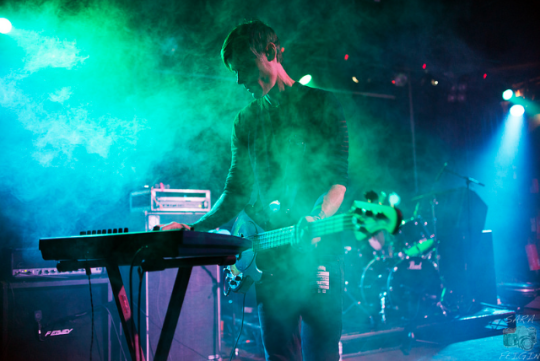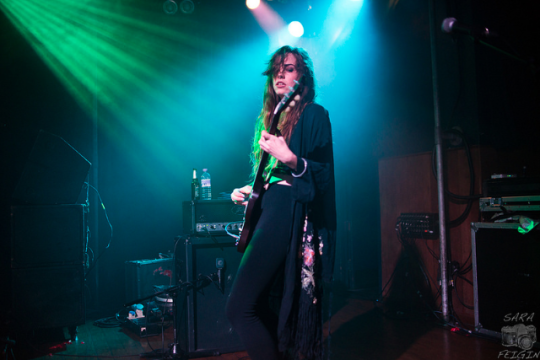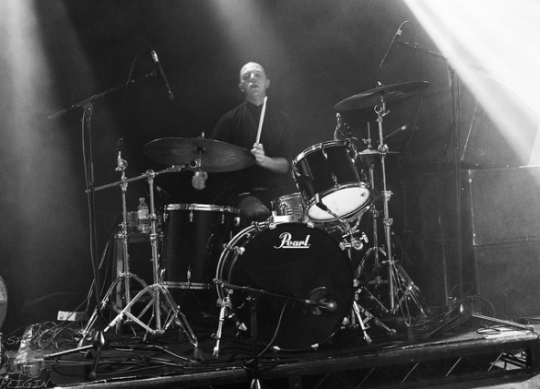

Photos by Sara Feigin
See full Photoset HERE
L.I.F.E. Press: So you and Emma were in another band together before Marriages, right?
Greg Burns: We were. We were in a band called Red Sparowes but Sparowes is on a bit of a hiatus now. She played on the last Red Sparowes record and she was in the band for several years, but now we have Marriages.
LP: The instrumentals in the two bands have a similar feel, what made you guys decide to branch off and do something where you’ve incorporated vocals?
GB: We just really wanted to do something that was different than Red Sparowes that was a big part of it. On Kitsune, the first record, the vocals were more of a texture or an instrument in a way. On Salome they’re more prominent, but that was just the evolution of the band. We didn’t just want to have another instrumental band because we felt it would be too similar to Red Sparowes. We consciously wanted to have shorter more concise songs, and we wanted to do something that stood apart from Red Sparowes.
LP: On the topic of the vocals being more of a texture; what made you guys decide on Salome to put the vocals at more of the forefront of the songs?
GB: It was kind of just an evolution of the band. I think it just happened naturally when we writing the songs that it became more vocal centric. We didn’t decide until we were mixing the record to push the vocals up to the front. It wasn’t an explicit decision that we made, it just kind of happened.

LP: Since Salome is a bit different from Kitsune, how’s the response been while you’ve been touring since Salome was released in April?
GB: We’ve done a lot of touring on it now. We went to Europe with Wovenhands and that was amazing. The reception was really good, we were excited to see that people knew the songs and were singing the lyrics and stuff that was cool. We headlined The States, that’s the first time we did a headlining tour there, and it was good. The turn out in some places was better than others the cities were great. There were some really great stand out shows, like New York and Austin were especially good. In L.A. we had a lot of fun. We’ve started mixing it up, it’s important to us to really push ourselves in a lot of different ways including the performance aspect of it. About halfway through we started changing the configuration of where our instruments are set up and we would play on the floor sometimes and just anything to just sort of keep it fresh and stop it from being the same repetitive thing. The tour was awesome and we played Arctangent a couple of days ago and that was a really amazing experience.
LP: With Arctangent Festival, which has only been around for 3 years now, was it exciting to play something that’s so new and genre specific?
GB: It’s different from a lot of festivals in that it is very specific in terms of the music that they host. The things I thought were great about the festival were being new [as a band] and there were a lot of Sargent House (their record label) bands’ there, it was like a big kind of family thing going on there and a lot of friends were there, and it wasn’t so massive that you weren’t able to connect with people. It was cool to be able to hang out with everybody, including the people at the festival because at a lot of Festival’s there is an artist area that people never leave, but at Arctangent that sort of existed but it was far away from everything, so it was easier to just be at the festival. Which was very cool because it was cool to talk to people and actually be there and enjoy it. As far as the genre thing goes, I have mixed feelings about that, I do like it, because what happens is people there will go and see every band that’s playing, and they’re just committed to even checking out bands they’ve never heard of. At bigger Festivals though they’re there to see the three bands they love and maybe they’ll go check other stuff out, so it’s cool that people there just really love the music. But on the other hand, I do personally like when Festivals have a variety because I think it exposes bands to a kind of audience they would normally get exposure to. But Arctangent is a very special thing and I think what they’re doing is really very cool.
LP: So listening to your music, it feels like more than just an average band, it feels a bit like listening to an art piece. I get the vibe that I could like see you guys perform as an art instillation. Was that a thing you were going for, or am I just projecting my views on your music?
GB: Yea, I mean not in those terms, but I think that we try and do a lot outside of just playing music. We do try in our performance to do things that are different, more in the way that we engage with each other when we play, it’s more of a personal experience that we try and bring people into, as opposed to bands that get out on stage, face out to the crowd, and play their songs. In other cases we will set up on the floor we’ll put the drums at the front of the stage, because there’s something that happens playing music that it’s very easy to get into this routine playing songs where it’s a) it’s no longer that fun [for me] and b) there’s no real variation so it becomes static in a way that defeats the purpose of playing live, at least for us. That’s one thing, and another thing is we are all artists outside of the band, what we try and do is make a statement through our artwork which is on the record and also that we put out into the world that we’ll usually sell at shows. Lots of times Emma will sell art prints and I’ll sell photographs, so the whole thing is about an expression is about both visual art and the music itself and the performance. Sometimes I think we totally fail at doing that and we’re just a band on stage, and other times I think it really works, and it’s a much bigger experience. But I really appreciate you saying that, I’m glad you get that from the music because it’s sort of what we’re after.

LP: So there were a couple years between the release of the first album and your second album, did you plan to take your time with the second album?
GB: No, there were a lot of challenges with the record; it took a year to even actually record it. We had some pretty big problems with the engineering itself and the studio, just a lot of logistical problems in that way. I’ve never had an album take a year to record, so that was really frustrating for us. And then writing the record took longer than we wanted, but that partly was because there were other things going on for people. My daughter had been born, and Emma’s solo project was taking off, she had put a record out and was touring. But the most that we really would want between records would be just a couple of years. So we weren’t really happy with the time break between records, and we’re going to do everything we can to avoid that in the future.
LP: This London show seems to be your last scheduled show of the year, do you have any other plans for the band for the rest of the year?
GB: Not for Marriages no. Emma is going on tour with Alcest and Andrew has a solo project called Drab Majesty, and he’s about to tour with King Dude. Yea so I think the next thing that’s going to happen with Marriages is probably in several months we’re going to start writing the next record. And obviously if any opportunities come up we’re going to take them, but I think we plan to just concentrate on writing the next record.
LP: So I don’t think I have any questions left for you. Do you have anything else you’d like to say out to the world?
GB: I appreciate your time and your interest, and I just feel really grateful to be able to tour and write music and that we capture people’s interest just means a lot, so thank you.
Interview from L.I.F.E. PRESS